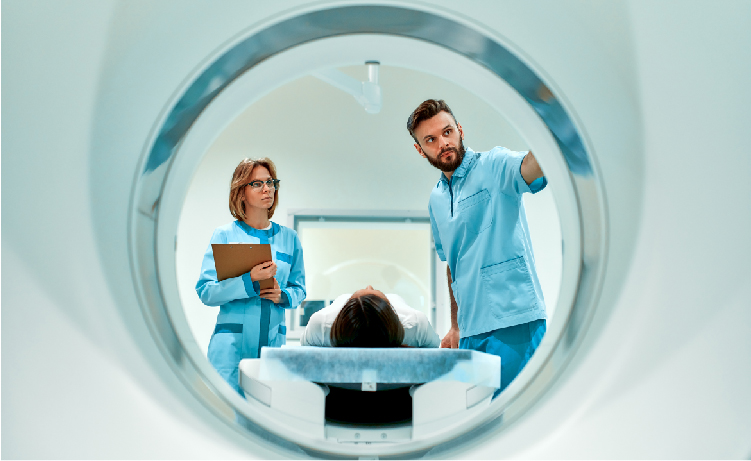Avg Price: $ 4000-$ 20000


Treatment Time
Recovery Time
Hospitalization Days
Success Rate
Radiation Therapy (RT), or radiotherapy is a treatment modality that relies on high-energy rays or radioactive substances to harm cancerous cells and impede their growth and division. For over a century, radiotherapy has proven to be a successful treatment for individuals with cancer. Since its introduction, the objective of RT has been to locally eradicate cancer while minimizing adverse effects. At least 50% of cancer patients undergo radiation therapy at some point during their cancer treatment trajectory. Over the past two decades, significant technological advancements have played a crucial role in enhancing the accuracy of this therapy, leading to notable improvements in its outcomes.
In India, it is estimated that approximately 2.5 million people are affected by cancer, with over 800,000 new cases emerging and 550,000 deaths occurring annually. Among Indian females, breast and cervical cancers are the most prevalent malignancies, whereas in males, aerodigestive tract cancers such as those in the lungs, stomach, esophagus, and head and neck are most common. Around two-thirds of cancer patients, totaling 500,000 individuals per year, require radiation therapy (RT), a locoregional treatment modality comparable to surgery. The primary objective of RT is to achieve optimal tumor control while minimizing harm to normal tissues.
Along with patient-centric focus, there is a considerable demand for multidisciplinary approach, procedural expertise and sophistication in RTs to enhance the overall quality of cancer care. India distinguishes itself globally for the outstanding proficiency of its cancer treatment specialists, attributed to their remarkable skills and access to advance as well as affordable healthcare facilities. As a result, people worldwide now have exceptional opportunities to access services from best doctors for radiation therapy and best hospitals for radiation therapy in India. If you're seeking insight, today, we'll shed light on this procedure and its details.
Radiation Therapy (RT) is a medical approach that involves utilizing ionizing radiations or radioactive materials to treat malignant (rapidly spreading to whole body) cancers. It can also be considered for treating certain benign (localized a part of body) conditions occasionally.
While the interaction between radiation and tissue yields various effects, the primary mechanism of action in radiotherapy is to eliminate cancer cells and impede their multiplying capacity. These outcomes may arise from direct harm to DNA or other crucial cellular components, a phenomenon frequently observed with particulate radiations like alpha particles, protons, or electrons. Alternatively, indirect cellular damage can occur, triggered by the generation of free radicals, as seen with X-rays or Gamma-rays.
Unfortunately, in the course of radiation therapy, there is a risk of damage and loss of normal cells, particularly those undergoing active divisions. However, this issue can be mitigated by precisely directing the radiation beam toward the tumor and by dividing the total radiation dose into fractions, allowing normal tissues to recover and undergo repair.
Why is Radiation Therapy needed?
Radiation Therapy is a comprehensive approach that not only kills cancer cells and reduces tumor size but also alleviates cancer symptoms. It can serve as the primary treatment or be employed strategically in various ways:
Take Charge of Your Health
Book a Free Consultation

There are two primary types of Radiation Therapy and both working by disrupting a cancer cell's DNA, leading to cell death and tumor reduction. These are:
These diverse approaches to radiation therapy offer tailored solutions for different types and locations of cancer.
For internal Radiation Therapy, a physical examination and imaging may be necessary. Your radiation oncologist will provide instructions on preparing for the procedure based on the method of radiation delivery.
In the case of external beam radiation therapy (EBRT), a planning session known as simulation is conducted. Simulation is a crucial step in customizing your treatment and involves:
Following the planning stage, your healthcare team will determine the specific type and dosage of radiation tailored to your individual case. This decision takes into account factors such as the type of cancer you are dealing with, your overall health, and your treatment objectives. The meticulous planning is essential to ensure accuracy in both the dose and targeting of the radiation beams. Precision in this regard minimizes the impact on healthy cells surrounding the cancer, contributing to a more targeted and effective treatment.
Your Health is Our Priority
Book a Free Consultation
You may expect following in external Radiotherapy:
You may expect following in internal radiotherapy:
Most individuals undergo radiation therapy across several sessions to avoid receiving the full dose all at once. This spaced-out treatment schedule allows healthy tissues time to recover between sessions, minimizing potential side effects. While your radiation oncologist will assist in managing any unpleasant side effects, it's essential to note that these effects typically impact only the specific part of your body receiving radiation. Possible side effects include:
Occasionally, side effects may emerge post-treatment, referred to as late side effects. In extremely rare cases, new cancers may arise years or even decades after the initial cancer treatment, potentially attributed to radiation or other therapeutic interventions. This phenomenon is known as a second primary cancer. To understand what side effects you may suffer, consult with your radiation oncologist, considering the type of radiation therapy recommended for your specific cancer.

Following internal radiation therapy, you typically return home after a brief recovery on the same day. In some instances, there might be a need for a hospital stay while your body eliminates minimal amounts of radiation. For systemic (IV) radiotherapy, you may excrete small amounts of radiation through bodily fluids like sweat, urine, and blood.
If you undergo IV or permanent internal radiation therapy, there is a slight risk of exposing others to radiation. It's essential to adhere to the guidance provided by your therapeutic team regarding the extent of contact you should have with others following radiotherapy.
You should be able to resume your regular daily activities both before and after external beam radiation therapy (EBRT), with no risk of exposing others to radiation.
Avail the Expert Health Advice
Book a Free Consultation
Following Radiation Therapy, imaging tests may be conducted to assess whether the cancer is undergoing shrinkage. The response to radiotherapy can vary, with some cancers showing immediate improvement, while in other cases, it may take weeks or months to observe the treatment's effectiveness. It's advisable to inquire with your radiotherapy team about the anticipated timeline and outcomes specific to your situation.
Now that your radiation therapy is over, you might be contemplating some health-oriented goals to pursue. Engaging in physical activity, maintaining a nutritious diet, achieving a healthy body weight, and refraining from smoking can contribute to:
A personalized wellness plan is a crucial component of your post-treatment care. Tailored to your individual needs, preferences, and fitness level, it will likely differ significantly from that of another survivor. This plan is designed to help you feel better and support your recovery after cancer treatment.
Radiation therapy stands as a pivotal contributor to global cancer cures, accounting for 40% of all successes while significantly enhancing the quality of life for many individuals. Notably, external-beam radiotherapy emerges as a highly successful treatment for prostate cancer, as evidenced by a cure rate of 95.5% for intermediate-risk cases and 91.3% for high-risk cases. The 5-year survival rate of 98.8% underscores the overall efficacy of this approach. Research from the Journal of Medical Imaging and Radiation Oncology in 2015 confirms the superiority of external-beam radiation therapy, with results comparable to or surpassing other common treatments like surgery or brachytherapy.
In various cancers, including breast, bowel, uterine, skin, and prostate cancer, this therapy proves highly effective in reducing the risk of recurrence when administered before or after surgery. Moreover, for specific cancers such as prostate, head and neck, bladder, lung, cervix, and skin cancers, radiotherapy, either alone or in combination with drug therapy, serves as a primary curative treatment, offering an alternative to surgical risks and organ removal.
Even in cases where cure is not possible, radiotherapy can be effective in relieving pain and addressing cancer-related issues, such as bleeding. However, technological advancements in recent years have further improved the lives of cancer patients by making radiation treatments quicker, more precise, and highly effective.
The cost of Radiation Therapy in India is quite affordable than many Western nations, while still maintaining world-class quality. The approximate price of this procedure in India ranges from ₹ 60,000 ($772) to ₹ 2,25,000 ($2895).
| Location | Minimum Cost ($) | Average Cost ($) | Maximum Cost ($) |
| Delhi | $ 6533 | $ 15129 | $ 30259 |
| Mumbai | $ 6773 | $ 15684 | $ 31370 |
| Chennai | $ 5874 | $ 13602 | $ 27206 |
| Hyderabad | $ 5694 | $ 13186 | $ 26373 |
Following are the factors affecting cost of Radiation Therapy in India:
The cost for diagnostic tests and evaluations linked to radiation therapy can fluctuate due to several factors. These factors include the particular tests needed, your choice of healthcare facility or clinic, and your geographical location. The following is the approximate diagnostic cost split for this treatment:
| Diagnostic Procedure | Cost |
| Biopsy | USD 429 to USD 500 |
| Endoscopy | USD 19 to USD 386 |
| X-Ray | USD 10 to USD 25 |
| PET Scan | USD 193 to USD 800 |
| Fine Needle Aspiration (FNA) of the lymph nodes | USD 10 to USD 32 |
| Magnetic Resonance Imaging (MRI) scan | USD 26- USD 321 |
| Computerized Tomography (CT) Scan | USD 26 to USD 400 |
MedFlick, your trusted healthcare companion, is dedicated to ensuring that your medical journey goes as smoothly and successfully as possible.
Fostering expertise backed by commitment, resilience and years of experience, we connect you to a wide network of India's best doctors
Explore the most advanced, reputable and trusted hospitals in India, offering the highest levels of clinical and surgical excellence

The worlds most trusted personalized health community with more than 1,00, 000 members that share their journey, experiences and health insights. Join your community and get access to make informed health decisions.
Explore


